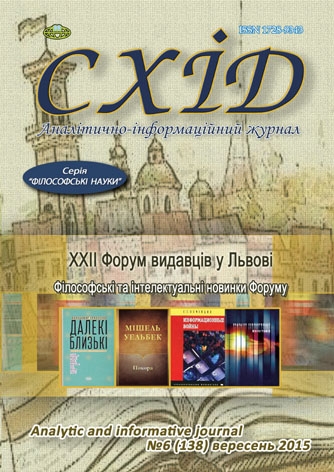Contemporary criticism of Orthodox Christianity in Russian Federation
DOI:
https://doi.org/10.21847/1728-9343.2015.6(138).54649Keywords:
Orthodox Christianity, contemporaneity, Russia, ROC, Orthodox Church, criticismAbstract
The article deals with the topic of contemporary criticism of Orthodox Christianity in Russia. A detailed picture of the phenomenon of religious criticism in today's socio-cultural discourse is presented, several leading directions criticism of orthodoxy, both from representatives of the church, and from among the representatives of secular society is analyzed. Criticism of Contemporary Orthodoxy reflects the contradictory situation of religion in the modern world. The collapse of the Soviet ideological system created a certain ideological vacuum which was to fill the Russian Orthodoxy. Selected influenced by internal "Right Forces" conservative development path gradually became more controversial and contrasted with liberalism 90s in Russia. Sharp government policy in the direction of conservatism during the presidency of Vladimir Putin considerably influenced the process of convergence of church and state. In the official Church rhetoric were conflicting narratives, in terms of many in the liberal society like "Russian world" and "Symphony of spiritual and secular power". In general conservative course of Russia socio-political role of the Church began to gradually narrow to the State Institute of spreading the conservative and nationalistic ideology. This contradictory position of the Church caused a consistent criticism on the part of members of secular society, and by the different origin and political orientation of internal Church groups. Secular society representatives focused on the growing level of ecclesiastical fundamentalism, political and economic activity of the Сhurch, its rapprochement with the state and attempting to influence the institution of public education. Liberal-minded members of the Сhurch community criticized domestic conservatism, lack of reforms, strict hierarchy, low educational work of the Сhurch. Conservative circles of ROC criticized the passivity of the Russian Orthodox Church in opposition to ecumenism and globalization processes.
Downloads
References
Verkhovskiy А. (2003), Political orthodoxy: Russian Orthodox nationalists and fundamentalists, 1995 - 2001, SOVA,Moscow, 317 p. (rus).
Register № 56 of the Holy Synod of Russian Orthodox Church from June 28th (2008), available at: http://www.patriarchia.ru/db/text/429543.html (rus).
Constitution of theRussian Federation(2014), EKSMO,Moscow, 80 p. (rus).
Коstiuk K. N. (2000), Orthodox fundamentalism, Polis, Political Studies, Vol. 5, p. 133 (rus).
Мitrokhin N. А. (2006), Clericalization of education inRussia: a public debate on the introduction of the subject "Fundamentals of Orthodox Culture" in secondary school curricula, Institute for the Study of Religion in CIS and Baltic countries, available at: http://religion.gif.ru/clerik/clerik.html (rus).
Мitrokhin N. А. (2004), Russian Orthodox Church: the current state and actual problems, NLO,Moscow, 648 p. (rus).
Мitrokhin N. (2003), Russian Orthodox Church - the results of the decade, Еmergency ration, available at: http://magazines.russ.ru/nz/2003/6/mit35.html (rus).
ROC Policy: consolidation or disintegration of the country? (2007), available at: http://old.novayagazeta.ru/data/2007/kentavr03/00.html (rus).
Federal Law from 26.09.1997 N 125-FZ "On Freedom of Conscience and Religious Associations", available at: http://www.consultant.ru/document/cons_doc_LAW_16218/ (rus).
Shaburov N. V. (2009), Applied Religious Studies for journalists, Prava cheloveka, Moscow, 254 p. (rus).
Downloads
Published
How to Cite
Issue
Section
License
Copyright (c) 2015 Svitlana Shkil

This work is licensed under a Creative Commons Attribution-NonCommercial-NoDerivatives 4.0 International License.
1. Authors bear responsibility for the accuracy of facts, quotations, numbers and names used.
2. Manuscripts are not sent back.
3. The publisher does not always agree with the authors' opinion.
4. The authors reserve the right to authorship of the work and pass the first publication right of this work to the journal under the terms of a Creative Commons Attribution-NonCommercial-NoDerivatives 4.0 International License. This license allows others to distribute (copy) the published work for non-commercial purposes, provided there is mandatory attribution to its authors and a link to the first publication in our journal.
5. The authors have the right to conclude separate supplement agreements that relate to non-exclusive work distribution in the form in which it has been published by the journal (for example, to upload the work to the online storage of the journal or publish it as part of a monograph), provided that the reference to the first publication of the work in this journal is included.

